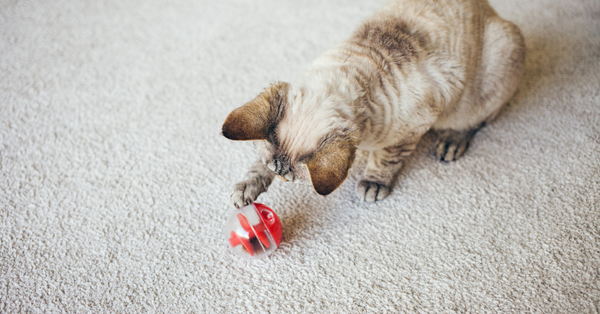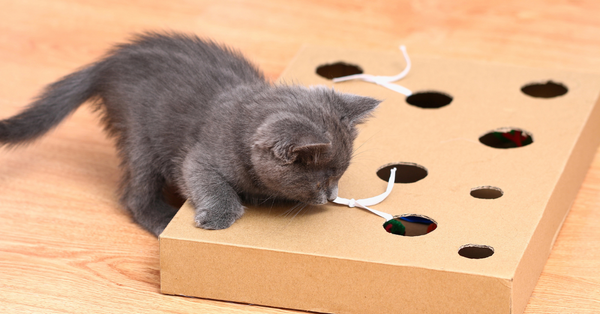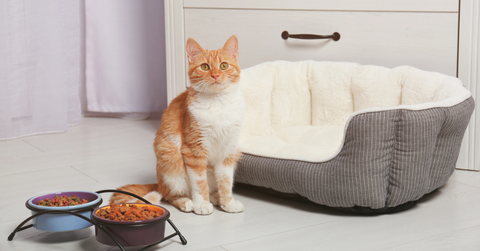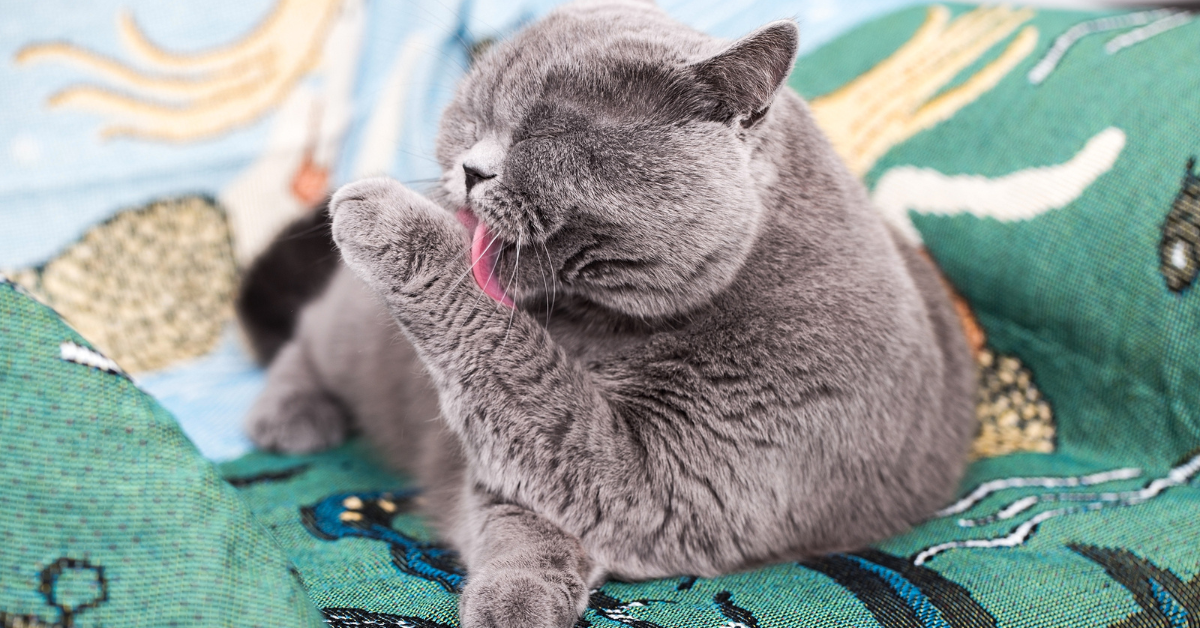How to Keep Your Cat Busy at Night (So You Can Sleep)
For many cat owners, the quest for a good night's sleep while keeping their feline friends content and engaged can seem like a never-ending battle. Cats, naturally more active at night or early in the morning, often disrupt your sleep schedules with nocturnal activity, whether through playful nature or seeking attention.
This blog aims to provide practical strategies to keep your cat busy at night so you—and your cat—can enjoy uninterrupted rest.
Understand Why Your Cat Is Active at Night
Cats being active at night or showing more energy during the evening and early morning hours can seem puzzling to their human companions. This behavior, however, is rooted deeply in their nature and evolutionary history. Understanding why your cat might be more active at night involves exploring several key factors:
Nighttime Instincts
Cats are naturally crepuscular, which means they are most active during dawn and dusk. This behavior stems from their wild ancestors who hunted during these times to avoid larger predators that were active during the day and to capitalize on the behavior of their prey. Domestic cats still retain this instinct, even though they no longer need to hunt for food.
Sensory Adaptation
Cats have evolved to hunt in low-light conditions. Their eyes can adjust to various light levels better than humans, allowing them to see relatively well in darkness. This makes nighttime ideal for them to explore and simulate hunting activities.
Energy Conservation
During the day, cats often sleep and rest, conserving their energy for bursts of activity. This rest-and-activity cycle means they are ready to engage in more physical activities by evening.
Human Activity Patterns
When human activity is at its lowest, the quiet of the night encourages cats to explore and play. During the day, the hustle and bustle of household activities and noises can deter them from being as active.
Boredom and Lack of Stimulation
Sometimes, cats become more active at night due to boredom or insufficient daily stimulation. Providing interactive toys, engaging in playtime, and offering climbing trees or perches can help tire them out and adjust their sleep cycles to be more aligned with their human family members.
To reduce nighttime activity, try adjusting your cat's routine to include more interactive play and activities during the day, especially in the evening before bedtime. Feeding your cat a small meal before bedtime can also mimic their natural hunting cycle, making them feel sleepy after eating.
Remember, every cat is unique, and what works for one may not work for another. Observing your cat's behavior and preferences will help you tailor the best solution for both of you.
Crafting a Nighttime Routine for Your Cat
A consistent schedule is key to keeping your cat healthy and helping you sleep better at night. Establish an evening routine that matches their natural behaviors of hunting, eating, and sleeping to make them happier and more in tune with your routine. This routine should have specific times for playing, eating, and calming down before bedtime. Here's how you should plan it the right way.
Evening Play Sessions

Interacting with your cat during the evening can help align their routine with yours. Playtime that involves toys such as feather wands and laser pointers plays into their natural hunting instincts, keeping them busy and increasing the likelihood of sound sleep throughout the night.
Allow your cat to successfully ‘capture’ their toy occasionally while playing for optimum engagement and to avoid any potential aggravation.
Extending these play sessions later in the day allows you to influence your feline friend’s internal clock toward a better timetable that suits both of you.
Scheduled Feeding Times
Provide your cat with meals at regular intervals, including a light snack right before you sleep. This can help stabilize your cat's sleeping habits and minimize nighttime activity. Fulfilling your cat’s appetite early in the morning can prevent them from waking you up due to hunger.
Using automated feeding devices is beneficial because they allow meals to be released at designated times. This practice helps realign your cat’s periods of activity more closely with your schedule.
Calming Pre-Bed Rituals
Creating a tranquil environment in the evening can signal your cat that it’s time to wind down and prepare for sleep. Engaging in soothing activities with your feline, such as:
- Gentle cuddles
- Playing quiet music
- Providing a warm blanket
These can help calm your pet and signify that it’s nearing bedtime. Switching off automatic lights reduces potential disruptions and helps establish an ambiance suitable for sleep, assisting your cat in drifting off and enjoying an undisturbed night of rest.
Enrichment Toys to Keep Your Cat Entertained
Choosing the appropriate toys ensures your cat stays entertained at night without disrupting your sleep with noise. Puzzle toys, silent electronic toys, and homemade options can all facilitate interactive play that keeps your cat engaged through the nighttime hours.
Puzzle Toys for Mental Engagement
Puzzle toys are fantastic for keeping cats mentally stimulated and engaged. They help prevent boredom and encourage your feline friend's natural instincts to explore, hunt, and solve problems. Here’s a rundown of various types of puzzle toys that can help keep your cat mentally sharp:
- Treat Balls and Dispensers: These toys dispense treats or kibble when your cat figures out how to roll or manipulate them correctly. They're great for encouraging physical activity alongside mental stimulation.
- Puzzle Feeders: Similar to treat dispensers, puzzle feeders require your cat to solve a puzzle to access food. These can range from simple designs, where the cat must move pieces with their paws, to more complex contraptions requiring multiple steps to release the food.
- Track Toys: These toys often involve balls trapped in a track that your cat can bat at but not remove. Some versions have additional puzzles or treat compartments to stimulate your cat’s mind.
- DIY Puzzle Toys: You can create your puzzle toys with household items. For instance, you can hide treats inside a toilet paper roll and fold the ends to make a treat-dispensing toy or create a puzzle box by cutting holes in a small box and hiding toys or treats inside.
DIY Toy Ideas

You don’t have to spend much money to build a playground for your cat. Upcycling items from around the house, you can easily create furniture and toys that delight any playful feline. Ping-pong balls or cardboard egg containers can become captivating toys for energetic cats.
Designing Your Cat's Perfect Nighttime Space
Creating the perfect sleep environment for your cat is crucial for their health and to ensure you get undisturbed rest. This involves setting up a cozy bed, strategically positioning the litter box, and implementing safety precautions.
We will explore designing an optimal sanctuary that satisfies your cat’s needs while considering comfort and security measures.
The Ideal Cat Playground
Designing the perfect playground for your cat involves catering to its natural inclinations. Elevated spaces and structures for climbing can appease its instinct to ascend and oversee its surroundings. Also, ensuring you offer a vertical or horizontal scratching post that suits your cat’s specific behavior will promote its usage.
Essential Comforts: Beds and Litter Box

Ensuring your cat has access to cozy sleeping arrangements and appropriately placed litter trays is key to obtaining restful sleep at night. A canopy-style foldable bed with a soft cushion creates an inviting hideaway, whereas beds that sit off the ground appeal to cats who prefer elevated spots.
Cats suffering from separation anxiety or those fond of snuggling might find solace in something like the Purr Pillow Kitty, which replicates purring noises. This can help keep your cat calm and active while awake and assist in waking up during play sessions.
Paying attention to what brings joy to your pet will significantly improve its day-to-day life and facilitate a smooth transition when it’s time for your cat to wake from slumber. Recognizing and accommodating your feline’s preferences is essential for maintaining its happiness.
Safety Measures
To maintain a tranquil and safe space for your cat at night, it’s wise to consider taking precautions such as keeping the bedroom door shut. This action and implementing devices like white-noise machines, setting up an indoor cat tree, or a protected outdoor enclosure known as a catio can securely fulfill their natural inclinations.
Training Techniques to Discourage Nocturnal Wake-Ups
Utilizing training methods is a valuable tool in curbing disturbances during the night. By refraining from acknowledging behavior that seeks attention, employing positive reinforcement for calm play, and slowly modifying sleep patterns, you might experience more tranquil nights of rest.
Ignoring Attention-Seeking Behavior
Continually disregarding your cat’s efforts to rouse you during the night can deter this behavior. By persistently not responding to their nighttime activities, your cat may understand that such actions will not elicit your response.
If your pet's unusual behavior continues for too long, it could mean they are sick or upset, and you should consult a vet.
Positive Reinforcement for Quiet Play
Positive reinforcement can be extremely effective as a training technique. By offering your cat a treat following a play session before bedtime, you cater to their instinctual hunting cycle and promote calm behavior.
Gradual Adjustment of Sleep Schedules
You can help your cat align its periods of activity with your own by slowly modifying its sleep schedule. Encouraging more play and engagement in the evening can prompt your cat to shift its active times to match yours better.
Providing a modest portion of food at night may assist in calming them down, facilitating an adjustment of their active cycles that is harmonious with when you sleep.
Balancing Human and Feline Needs
Achieving a restful night’s sleep involves striking the right balance between people's and cats' needs. To attain this balance, one can utilize noise-reduction measures, focus on enhancing daytime engagements with their feline friends, and recognize when it is appropriate to seek advice from a veterinarian.
Soundproofing Solutions
Soundproofing measures can reduce the sounds made by your cat’s nocturnal behavior. Heavy carpets and draft stoppers for doors effectively soak up noise, allowing you to sleep better while your feline engages in play during the night.
Laying towels under doorways acts as a sound barrier, diminishing audio disturbance and creating a division between slumber zones and regions where your pet is active at night.
Importance of Daytime Interaction
Offering interactive toys and engaging in playtime throughout the day is beneficial for fulfilling your cat's daily exercise requirements and mitigating nocturnal activity. Regularly switching out an assortment of toys can keep a cat’s attention for solo play during daylight. Be mindful to recognize when cats display tiredness signs, such as panting or lying down after playing. These are signals that it is time to end the play session.
When to Consult a Vet
Should your cat display atypical behavior during the night, it’s imperative to consult a veterinarian. When older cats show signs of peculiar nighttime activities, it could be symptomatic of underlying health or behavioral conditions that require immediate attention from a vet.
Conditions such as hyperthyroidism, diabetes, and neurological problems can disrupt cats' sleep patterns. A thorough examination by a vet, along with potential bloodwork, might be necessary to diagnose and treat these medical issues effectively.
Be Fully Equipped in Mastering Your Cat's Nighttime Habits
Keeping your cat occupied at night is essential to ensure you and your feline friend can enjoy a restful sleep. For many cat owners, the challenge of managing their pet's night activity without disrupting the household's sleep schedule is real. Cats, naturally crepuscular animals, tend to be most active during the early morning and late at night. This can lead to disrupted sleep if your cat wakes you up wanting to play or be fed.
By understanding and adapting to your cat's natural behaviors while providing stimulating activities and a comfortable environment, you can create a harmonious living situation where you and your cat can rest easily through the night.
Remember, patience is key. It might take a few nights for your cat to adjust to new routines or toys. However, with the right approach, you can ensure your cat remains active and engaged during peak hours without sacrificing sleep.
Lastly, investing in high-quality pet products can significantly enhance your efforts. Petmate offers your cats the best quality pet products, from interactive toys that keep your cat busy to comfortable beds that encourage them to sleep. Shop at Petmate today to ensure both you and your feline friends can enjoy a good night's sleep.
Related posts
View all-

Celebrate National Pet Week: Fun Ideas to Celebrate with Your Pet
National Pet Week is right around the corner, so it's time to plan how you're going to celebrate! While we're sure you celebrate your pet all day every day... Read Article -

5 Simple Tips to Make Sure Your Cat Drinks Enough Water
Ensuring your cat stays hydrated is important, but it can be challenging since many cats don't drink enough water. Dehydration can lead to kidney disease and other health issues. Fortunately, you can encourage your cat to drink more with a few simple changes. Read Article -

Should You Bathe Your Cat? Everything You Need to Know About Cat Hygiene
When it comes to cat hygiene, a common question among cat owners is, "Should you bathe your cat?" Understanding how to care for felines, especially bathing cats properly, is crucial for maintaining their overall health. Most cats are fastidious groomers, but specific scenarios like long-haired cats getting dirty or skin irritations, might require a bath.
Read Article





